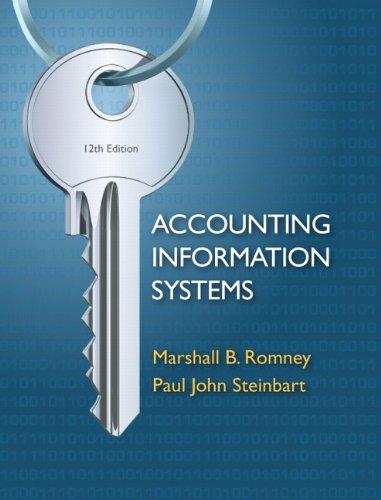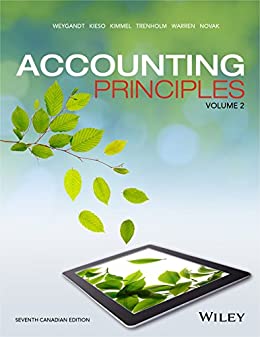Description
Test Bank For Accounting Information Systems, 12 Edition Marshall B. Romney
Accounting Information Systems, 12e (Romney/Steinbart)
Chapter 2 Overview of Transaction Processing and ERP Systems
1) What usually initiates data input into a system?
A) The transaction system automatically checks each hour to see if any new data is available for input and processing.
B) The performance of some business activity generally serves as the trigger for data input.
C) A general ledger program is queried to produce a trial balance at the end of an accounting period.
D) Data is only input when a source document is submitted to the accounting department.
2) An ERP system might facilitate the purchase of direct materials by all of the following except
A) selecting the best supplier by comparing bids.
B) preparing a purchase order when inventory falls to reorder point.
C) routing a purchase order to a purchasing agent for approval.
D) communicating a purchase order to a supplier.
3) Which of the following is not true about the accounts receivable subsidiary ledger?
A) Debits and credits in the subsidiary ledger must always equal.
B) Every credit sale is entered individually into the subsidiary ledger.
C) The total of the subsidiary ledgers must equal the control account.
D) The subsidiary ledgers play an important role in maintaining the accuracy of the data stored in the AIS.
4) Which of the following is not usually a consideration when designing a coding system?
A) Government regulations on coding systems
B) Standardization
C) Future expansion needs
D) Facilitating report preparation
5) The general ledger
A) summarizes the transactions in journals.
B) only includes balance sheet accounts.
C) is posted in total to the general journal.
D) is the initial place to record depreciation expense.
6) For a retail business, a delivery of inventory, from a vendor (with whom there is an established credit relationship) would be initially recorded in which type of accounting record as part of which transaction cycle?
A) purchases journal; expenditure cycle
B) general journal; expenditure cycle
C) general ledger; expenditure cycle
D) cash disbursements journal; production cycle
7) Which of the following statements regarding special journals is not true?
A) The balances in a special journal must always reconcile to the general ledger.
B) Special journals are used to record large numbers of repetitive transactions.
C) Special journals are periodically summarized and posted to the general ledger.
D) Special journals provide a specialized format for recording similar transactions.
8) Changing an employee’s hourly wage rate would be recorded in which file?
A) Employee master file
B) Employee transaction file
C) Payroll master file
D) Payroll transaction file
9) A typical source document could be
A) in some paper form.
B) a computer data entry screen.
C) a notepad entry.
D) both A and B
10) Which step below is not considered to be part of the data processing cycle?
A) data input
B) feedback from external sources
C) data storage
D) data processing
11) Data must be collected about three facets of each business activity. What are they?
A) the business activity, the resources it affects, the people who participate
B) the business activity, the transactions it creates, the impact on the financial statements
C) the inputs, outputs and processes used
D) who is involved, what was sold, how much was paid
12) The issuing of a purchase order is part of which transaction cycle?
A) the revenue cycle
B) the production cycle
C) the human resources cycle
D) the expenditure cycle
13) The collection of job time tickets or time sheets is part of which transaction cycle?
A) revenue cycle
B) production cycle
C) human resources cycle
D) expenditure cycle
14) Common source documents for the revenue cycle include all of the following except
A) sales order.
B) receiving report.
C) delivery ticket.
D) credit memo.
15) Which of the following documents would be found in the expenditure cycle?
A) delivery ticket
B) time card
C) credit memo
D) purchase order
16) Documents that are sent to customers or suppliers and then sent back to the company in the course of a business transaction are known as
A) turnaround documents.
B) source documents.
C) source data automation.
D) transaction documents.
17) Which of the following is an example of source data automation?
A) a utility bill
B) POS (point-of-sale) scanners in retail stores
C) a bill of lading
D) a subsidiary ledger
18) Pre-numbering of source documents helps to verify that
A) all transactions have been recorded since the numerical sequence serves as a control.
B) source data automation was used to capture data.
C) documents have been used in order.
D) company policies were followed.
-28
19) Source documents generally help to improve accuracy in transaction processing because
A) they specify which information to collect.
B) logically related data can be grouped in the same area of the document.
C) they provide directions and steps for completing the form.
D) All of the above are correct.
20) When the sum of all entries in the subsidiary ledger equals the balance in the corresponding general ledger account, it is assumed that
A) the recording processes were accurate.
B) all source documents were recorded.
C) adjusting entries are not required.
D) no errors exist in the subsidiary ledger.





Be the first to review “Test Bank For Accounting Information Systems, 12 Edition Marshall B. Romney”